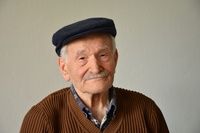Born in 1925 into a Hungarian family in the village of Tomášikovo in the south of Slovakia. His parents made a living as hired labourers for wealthy farmers. He went through eight grades at general school, four in a Hungarian school and four in a Slovak one, before leaving to help his parents on their smallholding.
After the German-supported Arrow Cross Party came to power in Hungary in 1944 he was, like the majority of young Hungarians, taken away to do forced labour in Germany. At the start of 1945 he was among around 100 young men transported via Cheb to a transit camp in Schönawald, Bavaria. There they worked for a time at a local airport, though plans were in place to deploy them within German army combat units
To that end selected men were transferred to the Benešov district, where there was a German army training area, in mid-March. They were accommodated in a school in Pikovice. However, due to rapid developments at the front they were never deployed in battle. After the entire platoon found themselves without commanders on 6 May 1945 the soldiers gradually scattered. A group of Hungarians around Ladislav Jankovič attempted to reach home but were arrested in Milín by Red Army soldiers. They were subsequently interned at a POW camp.
In mid-June the Hungarians were transported via Bratislava to a transit camp in Hoszany near Lviv (today Hradivka). From there they were sent to the USSR on freight trains two weeks later. After a month-long journey they reached the Volga and a camp at the freshly founded village of Otvazhnoye (today Zhigulyovsk). The prisoners were put to work putting up buildings in the village. As an interpreter, Ladislav Jankovič had more freedom than the others.
In 1946 the prisoners were transferred to a large POW camp in Kuybyshev (today Samara), where around 5,000 POWs of various nationalities were being held. While they initially suffered from hunger, conditions got markedly better in 1947 and the captives even received small wages. Ladislav Jankovič headed a group of locksmiths.
In May 1948 the camp was shut down and the prisoners released. The journey home took almost an entire month as Ladislav Jankovič passed through Debrecen and Budapest on his way to his native Tomášikovo. In civilian life he initially worked as a building labourer once again. Later he was employed as a zoo technician before become the chairman of the Local National Committee in Tomášikovo in the late 1950s. He subsequently worked as a standardiser in the local agricultural cooperative, which he went on to head. He was a member of the Communist Party of Czechoslovakia.
The story was processed by the Institute for the Study of Totalitarian Regimes for the project Central Eruopean Map of the Gulag.
